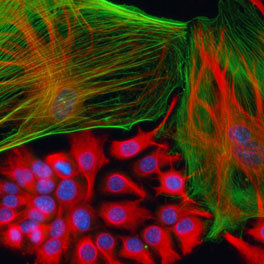For many years, a prevailing paradigm in cancer biology was that mutational aberrations in neoplastic cells are both necessary and sufficient for tumorigenesis, and thus cancer was believed to be a cell-autonomous process. However, it is now recognized that tumors are heterogeneous organs, composed of diverse stromal components, which are important players and not just innocent bystanders in the tumorigenic process. One of the lab interests is to study the role of cancer-associated fibroblasts, and the extracellular matrix components they secrete, in our mouse model of metastatic lung adenocarcinoma. Gaining a better understanding of the molecular pathways involved in the bi-directional communication between tumor and stroma will help us develop novel and better cancer therapies that target critical components of the tumor microenvironment.

Our understanding of the role of the tumor microenvironment in the development and progression of lung cancer remains rudimentary. The jacks lab wants to determine whether the stroma contributes to tumor progression as insights into the interactions between tumor and stromal cells may provide new opportunities for more focused therapeutic strategies. Immunofluorescent image using two different stromal-specific antibodies (in red and green) and a nuclear stain (in blue).

